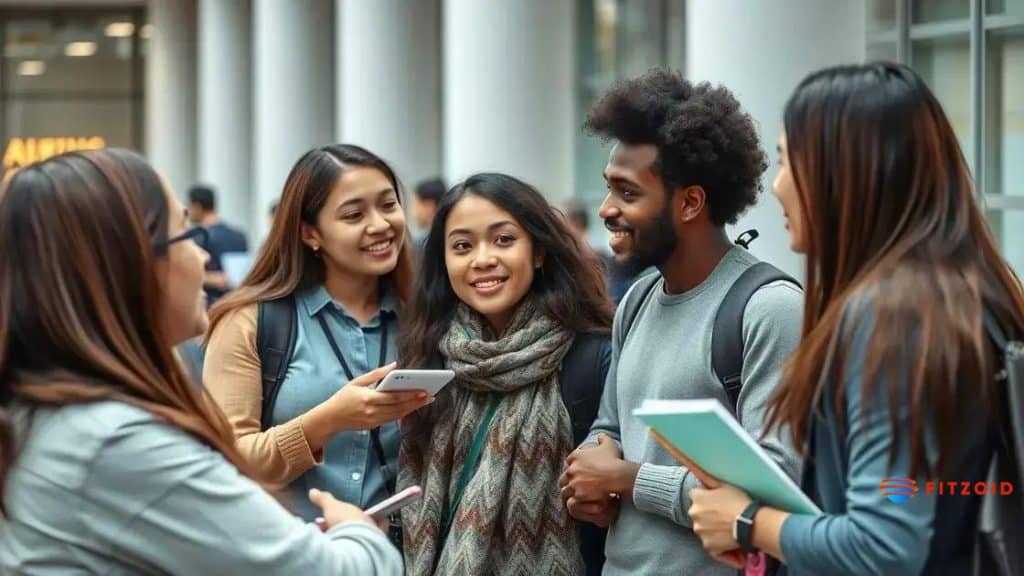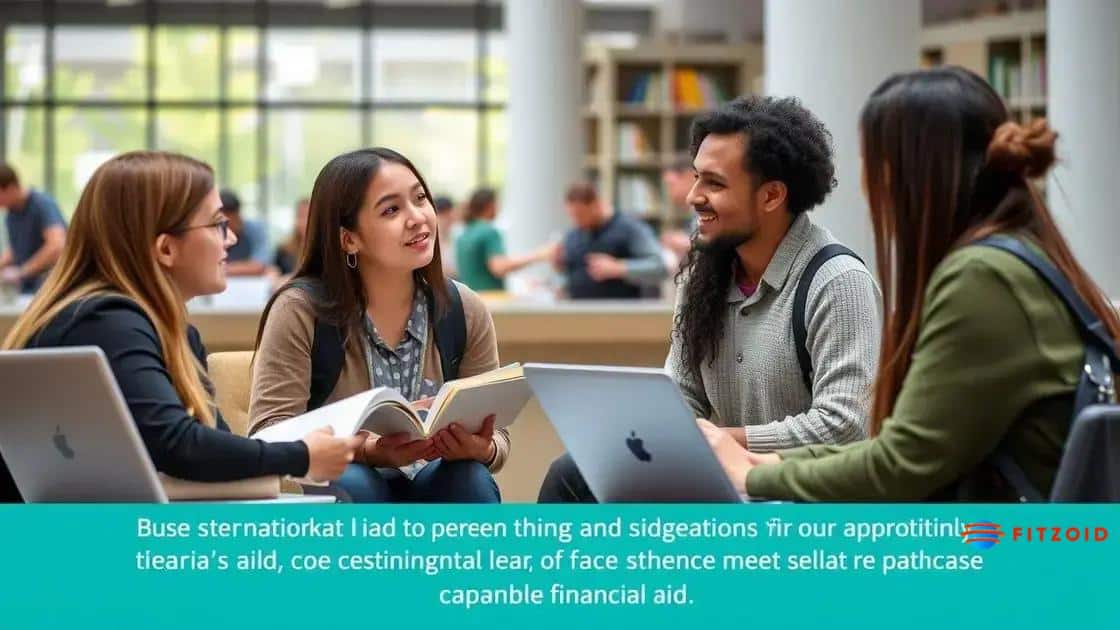Student visa policy changes: what you need to know

Anúncios
Student visa policy changes are reshaping admission processes, increasing work opportunities, and enhancing flexibility, making it easier for international students to pursue education abroad.
Student visa policy changes are making waves for those wishing to study abroad. Have you considered how these adjustments could influence your educational pursuits? Let’s dive into the details and see what it means for you.
Understanding the new visa regulations
Understanding the new visa regulations is crucial for any student looking to study abroad. With changes taking place, it’s essential to stay informed about these updates and their implications.
Anúncios
Key aspects of the new regulations
The recent student visa policy changes aim to simplify the process for international students. Many have been anxious about the shifting rules, but some adjustments make it easier to navigate.
- Streamlined application process: The new regulations introduce a more straightforward application process that reduces unnecessary steps.
- Extended visa durations: Certain visa types now allow for longer stays, which provides students with more time to complete their studies.
- Additional work rights: Some students can now work more hours during their studies, helping to ease financial burdens.
Moreover, it’s important to note that these changes vary by country. As a result, students should research the specific requirements and processes of their desired destinations. Taking the time to understand these regulations will ensure a smoother transition into studying abroad.
Anúncios
Common questions about the new regulations
Students often have questions about how these policies impact their education journey. Here are a few common queries:
- What documents do I need? Ensure you have all required documents ready, which may include proof of enrollment and financial statements.
- How do I apply for a visa? Follow the new guidelines carefully and seek assistance from your school’s international office if needed.
- What if I face issues during the application? Reach out to legal advisors or your educational institution for guidance.
By being proactive and informed, international students can better handle these changes and make the most of their educational opportunities. This new era of student visa regulations presents both challenges and exciting prospects for individuals looking to expand their horizons.
Key changes for international students

Key changes for international students are reshaping the way they approach studying abroad. With recent updates to student visa policies, it’s essential to grasp these alterations to make informed decisions for your education.
Increased flexibility in study options
One of the most significant changes is the enhanced flexibility international students now have when selecting their courses. This change makes it easier to balance studies with work commitments.
- Part-time study: Many schools now allow students to take courses part-time while working to support living expenses.
- Online classes: Options for online classes have expanded, allowing students to learn from anywhere and adapt their schedules.
- Broader program choices: Students can explore various programs and majors, providing them with more opportunities to align their education with career goals.
Additionally, the admission requirements have simplified for many institutions. This streamlining makes it easier for prospective students to understand what documents are needed and how to apply.
New financial assistance options
Financial considerations are always a concern for international students. In response to this, some governments and institutions are introducing new financial aid and scholarship programs designed specifically for them. These changes can help alleviate the stress of tuition fees and living costs.
- Scholarships: Many universities now offer tailored scholarships for international students, making education more accessible.
- Work-study programs: Some schools provide opportunities for students to work on campus, enabling them to earn money while studying.
- Low-interest loans: New loan options have emerged, allowing students to borrow money at lower rates for their education.
These key changes represent a positive shift for international students, allowing for a smoother transition into life abroad. By staying informed and understanding these updates, students can better navigate their educational journeys with confidence and ease.
How to adapt to the new policies
Adapting to the new policies regarding student visas can seem challenging at first, but with the right approach, it becomes manageable. Understanding these changes is key to ensuring a smooth transition into studying abroad.
Familiarize yourself with the updates
The first step in adapting to the new policies is to thoroughly familiarize yourself with the updates. This includes understanding any new requirements, deadlines, and necessary documents. Staying informed will help you avoid confusion and make the process easier.
- Review official guidelines: Check the official website of the country’s immigration office for the most accurate information.
- Attend orientation sessions: Many institutions offer orientations for international students to discuss the latest visa changes.
- Join student forums: Connecting with other students can provide valuable insights and tips on managing the transition.
Additionally, it is beneficial to maintain good communication with your educational institution. They often have resources available to assist you in navigating the changes.
Seek guidance when needed
Throughout this process, don’t hesitate to seek guidance if you feel uncertain. Advisors who specialize in international student concerns can be invaluable resources. They can help clarify policies and assist in completing necessary paperwork.
- Contact advisors: Reach out to international student advisors for guidance on visa applications.
- Utilize online resources: Many universities provide online resources and FAQs related to visa issues.
- Consult with legal professionals: If you encounter complex situations, consulting an immigration attorney is advisable.
Adapting to the new student visa policies involves taking proactive steps and remaining informed. By utilizing available resources, students can navigate these changes effectively and ensure their study experience remains positive. Keeping a flexible mindset will also help in overcoming challenges and making the most of the opportunities ahead.
Common questions about student visas

Common questions about student visas often arise during the application process. Recognizing these questions can equip students with the knowledge needed to navigate their studies abroad effectively.
What is a student visa?
A student visa is a special permit that allows international students to live and study in a foreign country. This visa ensures that students follow the regulations set by the host country while pursuing their education.
- Duration: Student visas are typically valid for the length of the study program.
- Restrictions: Certain work restrictions may apply, limiting the number of hours students can work.
- Extensions: Students may be able to extend their visa under specific circumstances, such as needing more time to complete their program.
Understanding the specific details of a student visa is essential for smooth sailing through the application process.
How do I apply for a student visa?
Applying for a student visa involves several steps and can vary by country. However, there are general steps that most students will follow. Gathering the necessary documents and meeting the specific requirements is crucial.
- Acceptance letter: Obtain a letter of acceptance from a recognized educational institution.
- Financial proof: Demonstrate financial means to support your studies and living expenses.
- Health insurance: Some countries require students to have health insurance before obtaining a visa.
Each country may have additional requirements, so it’s wise to check official immigration websites for detailed guidelines.
What if my visa is denied?
A visa denial can be disheartening, but it is essential to know what steps to take if this occurs. Review the reasons provided for the denial, which can range from incomplete documentation to not meeting financial requirements.
- Reapply: Students can often reapply after addressing the issues that led to the denial.
- Seek assistance: Consulting with an immigration attorney may provide clarity on the appeal process and options available.
- Stay informed: Ensure you stay updated on visa regulations and policies to avoid future issues.
Students need to remain proactive throughout the visa application process. By asking the right questions and seeking help when needed, they can navigate potential obstacles and successfully pursue their education abroad.
Future trends in student visa policies
Future trends in student visa policies are expected to evolve in response to changing educational landscapes and global needs. As countries recognize the importance of attracting international talent, these trends aim to create more flexible and supportive environments for students.
Increased digitalization
One significant trend is the increased digitalization of the visa application process. Many countries are moving towards online platforms that streamline applications for prospective students.
- Online applications: Most students will be able to submit their applications entirely online, reducing paperwork.
- Virtual consultations: Institutions might offer virtual meetings with advisors for guidance on applications.
- Digital tracking: Applicants could track their application status online, increasing transparency.
This shift towards digital solutions not only simplifies the process but also enhances accessibility for students worldwide.
Greater flexibility in visa regulations
Another trend is the shift toward more flexible visa regulations. Countries are becoming more open to varying durations of study and work rights for students.
- Short-term visas: Some countries may introduce short-term student visas to cater to exchange programs and summer schools.
- Work-study balance: Adjustments might allow students to work more hours while studying, providing financial support.
- Post-study work options: More countries are expected to offer post-study work visas, enabling students to gain experience after graduation.
Such flexibility can greatly enhance the overall experience for international students, making studying abroad more appealing.
Focus on diversity and inclusion
Lastly, future student visa policies may increasingly emphasize diversity and inclusion. Countries are recognizing the value that a diverse student body brings to their institutions.
- Targeted outreach: Institutions may implement programs to recruit students from underrepresented regions.
- Support services: Enhanced support services for international students will be crucial, as it helps to foster inclusivity.
- Scholarship opportunities: More scholarships may become available for students of diverse backgrounds to promote equity in education.
These trends highlight a promising future in student visa policies. By keeping an eye on these changes, students can better prepare for their educational journeys and ensure they take full advantage of new opportunities.
| Topic | Policy Change | Impact |
|---|---|---|
| Visa Duration | Extended stay periods | More time to finish programs |
| Work Rights | Increased work hours allowed | Improved financial flexibility |
| Digital Applications | Fully online submission options | Faster and easier process |
| Program Flexibility | More online and hybrid options | Greater learning adaptability |
| Financial Aid | New scholarships and loans | Eases tuition burden |
| Post-Study Visas | More pathways to work after graduation | Boosts career opportunities |
FAQ – Frequently Asked Questions about Student Visa Policies
What are the recent changes in student visa policies?
Recent changes include streamlined applications, increased work rights, and enhanced flexibility in course selection for international students.
How can I prepare for the new visa requirements?
To prepare, review the latest guidelines from your host country’s immigration office and attend orientations offered by your educational institution.
What should I do if my student visa application is denied?
If denied, carefully review the reasons given and consider reapplying after addressing the issues or seek advice from an immigration lawyer.
Will I have more opportunities to work while studying abroad?
Yes, many countries are increasing work hours allowed for students and providing options for post-study work visas.





